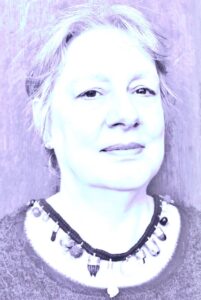About

Lilian Pizzichini is an author and podcaster based in west London. Her books include:
Dead Men’s Wages was published by Picador in 2002, and winner of Crime Writers Association Gold Dagger for Non-Fiction. She blends personal memoir with social history to tell the story of her grandfather, a conman who made money from long firms and bent coppers.
The Blue Hour: A Portrait of Jean Rhys was published by Bloomsbury in 2009 in the UK and Norton in the US, where it was shortlisted for the Marfield National Award for the Arts. The Blue Hour uses narrative non-fiction to tell the story of a complex, troubled and radical writer of the 20th century. It was a Radio 4 Book of the Week.
Music Night at the Apollo was published by Bloomsbury in 2014. It, too, blends fiction with fact to describe life on a narrowboat in Southall, west London and the life of the narrator’s ancestors in the tenements of 19th-century Lisson Grove. This memoir of addiction was a Spectator Book of the Year in 2014.
The Novotny Papers published by Amberley in 2021 continues the work of Dead Men’s Wages in tracking down the bent coppers and the S&M dominatrix who infiltrated the ring of villains surrounding the narrator’s grandfather. Mariella Novotny also got caught up in a Cold War honeytrap that bagged the president of the United States, John F. Kennedy. Back in London, she hosted the notorious Man in the Mask party at the centre of the Profumo Scandal. The Novotny Papers will be translated into Czech in 2025.
With her podcast, Raised Voice Radio, Lilian talks about the latest publications with other authors, how gender and class shape identity, how artists find meaning out of journeys of migration, and belonging in a constantly changing world.
Recent Journalism
Before Russia invaded Ukraine, in 2018, Lilian completed a journey by Trans-Siberian Express to Irkutsk in Siberia. This is the first in a series of articles describing Russia, a riddle wrapped in a mystery inside an enigma.
A thousand miles to the east of Moscow is the last city in Europe. To be precise, the fourth largest city in Russia, situated along the spine of the Urals and on the banks of the River Kama, is the easternmost city of the European subcontinent. The city is called Perm, although in 1940 Joseph Stalin renamed the city Molotov in honour of his Minister of Foreign Affairs. The name Perm was restored in 1957 in the wake of Nikita Khrushchev’s campaign of de-Stalinization. Shortly afterwards, as the Cold War intensified, the city became a Closed City, when it officially did not exist.
Before Covid, in 2019, Lilian took another train from the Pacific coast of Mexico across the mountains of the Sierra Madre to the valley of Chihuahua. This is the first in a series of articles describing a journey taken by Antonin Artaud, the French surrealist and author of The Peyote Dance in 1976.
“The people are poor here,” Julio started, pulling grilled meat off the bones and licking his fingers. “The drug trade mostly affects the indigenous people.”
Julio was intelligent and articulate about a subject that occupies the thoughts of many Mexicans: drug trafficking and the correct response to it.
“There is no welfare system in Mexico, so what are people supposed to do? Drug cartels pay mountain farmers to grow crops, process the harvest, guard the estates. They provide jobs for young guys who want to feed their families.”
In 1990 Lilian went inter-railing across eastern Europe in search of Baron Kurtz in Bucharest.
I found myself sitting on the platform of Wien Sudbahnhof waiting for a train to Bucharest and dreaming of waltzing down the River Danube. In the dream, my partner and I spiralled through rooms that had hosted the secessionist salons of Mitteleuropa. We landed on the couch of Freud’s 20th century, before spilling onto the streets and the opening scenes of The Third Man.
Some book reviews
Social affairs
Lilian worked as Writer-in-residence in HMP Chelmsford. This is her response to what she saw.
[everyone] felt unsafe within the prison grounds, and it was clear to me that the tension was not just between the prisoners. In the time I worked at Chelmsford, going in three days a week, I was aware of a bullying culture permeating the entire prison: from management to staff to prisoners. There were cliques among staff that affected those of us out of the loop. Morale was low, largely because of staff shortages; staff were encouraged to file Security Information Reports on each other, thus creating an atmosphere of mutual suspicion. Gossip, scandal and griping could very easily have filled our days.
Work-in-progress
Lilian has an MA in Creative Writing from City University.
Her next project is a work of autofiction, following a contemporary narrator’s reflection on her past; and her emotional and intellectual connections to the novelist Jean Rhys. It explores themes urgent for the narrator, including ageing, class, women’s experiences and the changing city. We open with the narrator at home facing the challenges that disability brings, and ways she escapes from reality. We meet her neighbours and the subject of her biography, Jean Rhys, only to realise that, one hundred years apart, life hasn’t changed much for women from disadvantaged backgrounds. However, inspiration can be found where it’s least expected.